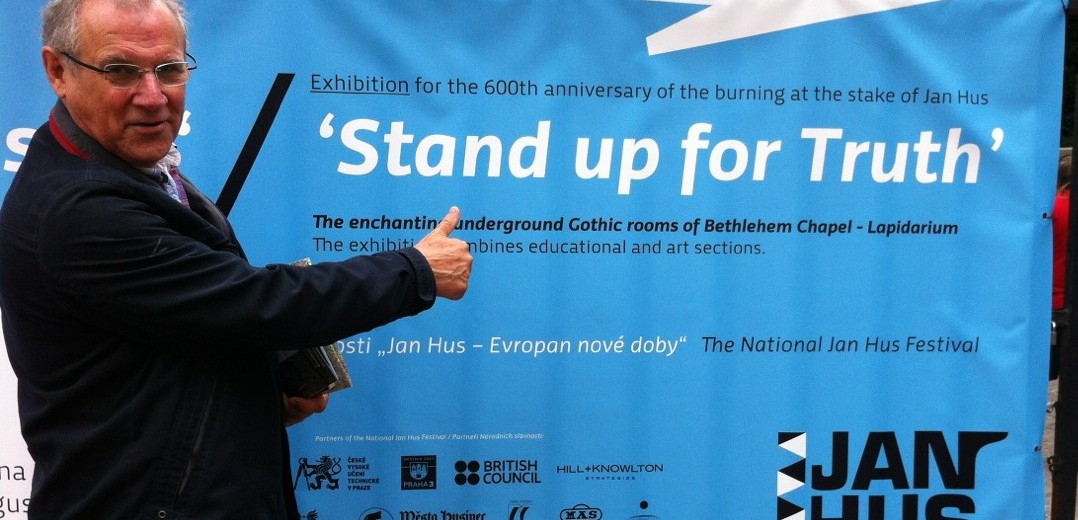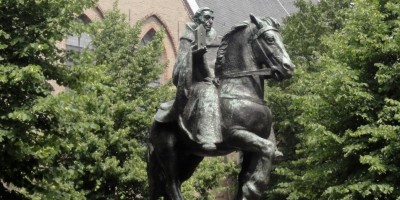Exactly six hundred years ago last Monday, the Czech reformer John Hus was burnt at the stake as a heretic by Catholic powers in Constance, southern Germany. As we arrived in Prague today halfway through the Continental Heritage Tour, the memory of this national hero and of his life message to ‘stand up for Truth’ was alive and well.
Last Monday’s commemorations began with a procession to the imposing bronze statue of Hus erected in the Old Town Square a century ago, during the First World War. Orchestras and bands provided a daylong programme in the square, climaxing with the Master Jan Hus Oratario and a candlelight procession to the Vltava River.
Around the historical centre of Prague, a variety of spiritual, cultural and social programmes are being held this month in what is collectively called The Commemoration Festival of Master Jan Hus 2015. The organisers explain that while Hus’ death was a great tragedy, they wish to celebrate the living legacy of Hus in both church and society.
An open air ecumenical worship service was celebrated also in the Old Town Square, while lectures, discussions, panels, exhibitions, and tours around Prague in the footsteps of Hus all combined to stimulate reflection on the current relevance of Hus’ life and message for Czechs today.
Travellers passing through Prague’s ‘Václav Havel International Airport’ are invited to view an exhibition tracing the influence of Hus from the 15th century to the present day. At Charles University, an exhibition explores Hus’ relationship with the university where he was once rector.
Truth prevails
Outside the restored Bethlehem Chapel, the cavernous 15th century meeting house where Hus preached regularly to large crowds in their native language, were banners announcing an exhibition in the chapel’s underground gothic rooms with the title, ‘Stand up for Truth’.
While in custody awaiting trial in Constance, Hus wrote his famous Rule of Seven: ‘Therefore, faithful Christians, seek the truth, hear the truth, learn the truth, love the truth, speak the truth, adhere to the truth, defend it to the death, for truth will free you.’
Hus had to practice what he preached, defending the truth to his death at the stake on July 6, 1415. Ever since, the Czech people have felt betrayed by both the Church and the Holy Roman Empire by this event which continues to live on in the collective memory of the nation.
In 1999, Pope John Paul II confessed the injustice of the trial and execution of John Hus for heresy with the following words: ‘Today, on the eve of the Great Jubilee, I feel the need to express deep regret for the cruel death inflicted on Jan Hus and for the consequent wound of conflict and division which was thus imposed on the minds and hearts of the Bohemian people.’
Hus’ slogan ‘Truth prevails’ inspired Tomáš Masaryk in his efforts to establish an independent state for the oppressed Czech and Slovakian peoples after the First World War, adopting the phrase as his motto when he became the first President of Czechoslovakia in 1918.
The Charter 77 movement leading the resistance to communist rule had the motto ‘Truth prevails for those who live in truth’, echoing the writings of dissident Václav Havel who as early as 1978 was urging his fellow countrymen to live for truth and not to accept the lie. ‘Truth and love must prevail over lies and hatred’, he repeatedly stated. While he was president, the Latin version ‘Veritas vincit’ was displayed on the presidential banner.
Relevant legacy
Lubomír Zaorálek, Czech Minister for Foreign Affairs, one of several cabinet ministers actively engaged in the Hus Festival, writes: ‘In these modern times the legacy of Jan Hus is increasingly relevant. In many respects society finds itself in a similar situation to that of his time. For this reason, the Czech public should remember Hus’ personality, not only on the occasion of this anniversary.’
Six centuries after the body of John Hus perished in the flames at Constance, his voice continues to be heard urging Czechs today that ‘Peace between a man and his neighbour can only come if he first makes peace with his God and so finds peace with himself.’
Last month, in a parallel apology to that of JPII, Pope Francis asked forgiveness of the Waldensian Church ‘for the non-Christian and even inhuman attitudes and behavior that we (the Catholic Church) have showed you’. Francis apologized in Turin, the city where an infamous massacre of more than 1,700 Waldensians was authorised on Easter week in 1655. This church was started in the 12th century after Peter Waldo was excommunicated in Lyon for preaching a similar message to Hus.
You can continue to follow our tour via regular video updates on the Schuman Centre facebook page.
Till next week,
Jeff Fountain
Till next week,


